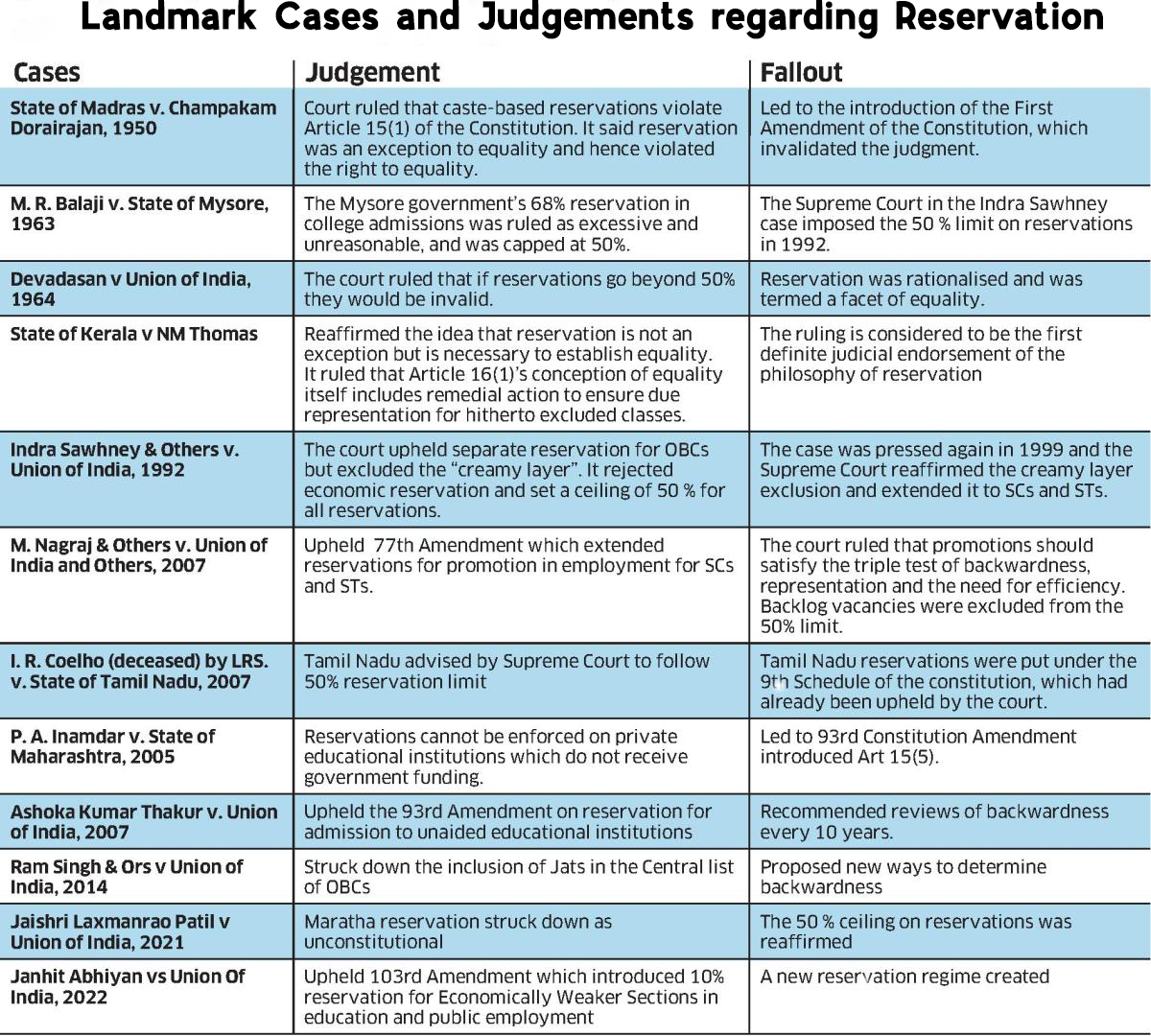Social Justice
Mandal Commission
- 24 Apr 2023
- 7 min read
For Prelims: Article 15, Article 16, Reservation, Indira Sawney Case, OBC Reservation, Mandal Commission, Rohini G Commission
For Mains: Mandal Commission, Reservation: Benefits and Challenges.
Why in News?
The second phase of the caste survey beginning in Bihar and several other political debates have brought Mandal Politics once again in news.
What is Mandal Politics and Mandal Commission?
- About:
- Mandal politics refers to a political movement that emerged in the 1980s, advocating for the inclusion of socially and economically disadvantaged communities, particularly the Other Backward Classes (OBCs), in government jobs and educational institutions.
- The movement was named after the Mandal Commission.
- Mandal Commission:
- The Mandal Commission or the second Socially and Educationally Backward Classes Commission, was established in India in 1979 with a mandate to "identify the socially or educationally backward classes" of India.
- It was headed by B. P. Mandal and submitted its report in 1980 and was implemented in 1990.
- The Commission reported that 52% of the country’s population was comprised of OBCs. Initially, the commission argued that the percentage of reservations in government service should match this percentage.
- However, this would have gone against the Supreme Court ruling in M.R. Balaji vs State of Mysore case (1963) which had laid down a limit of 50% on. There was already a 22.5% reservation for SCs and STs.
- Therefore, the figure of reservation for OBCs was capped at 27% which when added to keep the reservation below the 50% mark.
- The Commission also identified backward classes among non-Hindus.
- The Mandal Commission or the second Socially and Educationally Backward Classes Commission, was established in India in 1979 with a mandate to "identify the socially or educationally backward classes" of India.
- Recommendations of Mandal Commission:
- OBCs must be provided a reservation of 27% in public sector and government jobs.
- They should be provided with the same 27% reservation in promotions at all levels of public services.
- The reserved quota, if unfilled, should be carried forward for a period of 3 years.
- OBCs should be provided age relaxation similar to SCs and STs.
- Reservations to be made in PSUs, banks, private sector undertakings receiving government grants, colleges, and universities.
- The government to make the necessary legal provisions to implement these recommendations.
- Impact of Mandal Commission:
- Implementation of Mandal Commission by the government resulted in a widespread protest where students committed self-immolation in protest when the government showed its intent to implement it.
- The implementation was finally challenged in Indra Sawhney vs Union of India case.
What did the SC Rule in Indira Sawhney Case?
- In this case the Supreme Court held the 27% reservations for OBCs as constitutionally valid but with certain conditions:
- The court held that the reservation must be in the four walls of 50% cap and should not be extended in promotions.
- The concept of creamy layer was also introduced by the court to exclude well-off people from the community.
- The carry forward rule (by which unfulfilled vacancies are filled in the upcoming year) should not breach 50% ceiling.
What are the Merits of Mandal Commission?
- Increased Representation: The Mandal Commission helped in increasing the representation of SEBCs in government jobs and educational institutions.
- According to Ministry of Social Justice and Empowerment, OBC representation against total appointment through direct recruitment was consistently above 27% during 2014-2021.
- Access to Education: The reservation policy enabled many OBC students to gain access to higher education. This resulted in a significant increase in the number of OBC students in universities and colleges.
- According to the Ministry of Social Justice during the period of 2014-2021, the enrolment of OBCs in Higher Educational Institutions has been consistently increasing since 2014-15.
- Social Justice: The Mandal Commission's recommendations were based on the principles of social justice and aimed at providing equal opportunities to all sections of society, especially those who have been historically disadvantaged.
What are the Demerits of Mandal Commission?
- Limited Impact on Upliftment: The impact has been limited to a very few communities. According to the Justice Rohini G. Commission, out of almost 6,000 castes and communities in the OBCs, only 40 such communities had gotten 50% of reservation benefits for admission in central educational institutions and recruitment to the civil services.
- Politicisation: The politicians have often used the Reservation as their vote bank politics. During 1980s, the Mandal Commission was highly politicized giving a new form of Politics- Mandal politics.
- Even today, it is used as a political tool. Recently, a politician while campaigning in Karnataka has demanded to lift 50% limit on SC/ST/OBC reservation.
- Negative Impact on Merit: The reservation policy led to a negative impact on merit as many deserving candidates were left out, and the seats were filled by candidates with lesser merit.
Way Forward
- Periodic Review of Reservation Policy: The policy must be reviewed periodically to assess its impact as directed by the Supreme Court in Indira Sawhney vs Union of India case (1992).
- Improve Early Level of Education: The government must improve education at earlier levels so that the reservations at higher levels could easily be phased out.
- Increase Job Opportunities in Private Sector: The government should thrive to increase job opportunities in private sector to reduce dependence on public sector and reservation for employment.





